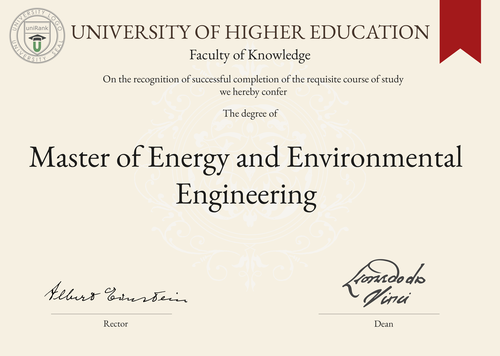
Master of Energy and Environmental Engineering (MEEE)
Guide to University Programs/Courses
Master of Energy and Environmental Engineering (MEEE)

Program/Course Name
Master of Energy and Environmental EngineeringProgram or Degree abbreviation:
MEEEDuration Range
Varies by country and university, typically 1-2 yearsTuition range:
Varies by country and university, typically $10,000-$30,000 per yearOverview
The Master of Energy and Environmental Engineering program is designed to provide students with advanced knowledge and skills in the field of energy and environmental engineering. It focuses on sustainable energy systems, environmental protection and the development of innovative technologies to address global energy and environmental challenges.Curriculum Overview by Year
The curriculum is structured to cover both theoretical and practical aspects of energy and environmental engineering. In the first year, students typically study core courses such as Energy Systems Analysis, Environmental Impact Assessment, Renewable Energy Technologies and Sustainable Development. In the second year, students can choose elective courses based on their interests and career goals, which may include topics like Energy Policy and Planning, Waste Management, Climate Change Mitigation and Advanced Environmental Modeling.Key Components
The key components of the program include a strong foundation in energy and environmental engineering principles, hands-on laboratory work, research projects and industry collaborations. Students also have the opportunity to gain practical experience through internships or co-op programs.Career Prospects
Graduates of the Master of Energy and Environmental Engineering program can pursue various career paths in both public and private sectors. They can work as energy consultants, environmental engineers, sustainability managers, renewable energy project managers, or researchers in academic institutions or research organizations.Salary Expectations
Salary expectations for graduates of the program can vary depending on factors such as the country, industry and level of experience. On average, professionals in the field of energy and environmental engineering can earn a salary ranging from $60,000 to $100,000 per year.Conclusions
It is important to note that the duration, tuition fees, curriculum, key components, career prospects and salary expectations of the Master of Energy and Environmental Engineering program can vary based on the chosen country or location of study, as well as the chosen university. Prospective students are encouraged to research and compare different programs to find the one that best fits their needs and goals. Visitors can search for where this specific degree (MEEE) is offered anywhere in the world through the uniRank World Universities Search Engine.World Universities Search Engine
search for Master of Energy and Environmental Engineering (MEEE) and add the Location (country, state etc.) or specific University you are interested in studying at.
Query examples:
- Master of Energy and Environmental Engineering (MEEE) United States
- Master of Energy and Environmental Engineering (MEEE) United Kingdom online
- Master of Energy and Environmental Engineering (MEEE) Australia international students
- Master of Energy and Environmental Engineering (MEEE) University of California
- Master of Energy and Environmental Engineering (MEEE) University of London tuition fees
- Master of Energy and Environmental Engineering (MEEE) University of Sydney scholarships